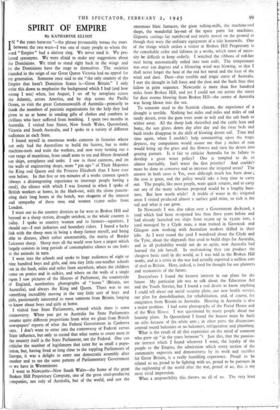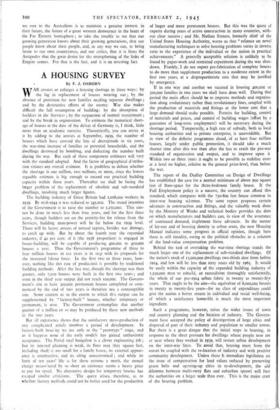SPIRIT OF EMPIRE
By KATHARINE ELLIOT N " the years between "—the phrase presumably means the years I between the two wars—I was one of many people to whom the word "Empire" had a sinister ring. We never used it. We pre- ferred synonyms. We were afraid to make any suggestions about the Dominions. We tried to stand right back in the wings and let the Dominions have the stage to themselves. The societies founded in the reign of our Great Queen Victoria had no appeal for my generation. Someone once said to me " the only country of the Empire that hasn't Dominion Status is---Great Britain." I only write this down to emphasise the background which I had (and how wrong I was) when, last August, I set off by aeroplane across the Atlantic, across America, and by ship across the Pacific Ocean, to visit the great Commonwealth of Australia—primarily to thank the members of patriotic organisations for the help they had given to us at home in sending gifts of clothes and comforts to civilians who have suffered from bombing. I spent two months in Australia. I visited four States, New South Wales, Queensland, Victoria and South Australia, and I spoke to a variety of different audiences in each State.
I found myself in enormous works canteens in factories where not only had the Australians to build the factory, but to make machine-tools and train the workers, and now were turning out a vast range of munitions, from small arms to ten and fifteen thousand ton ships, aeroplanes and tanks. I saw in those canteens, and on the walls of engineering shops, more " pin ups" of Their Majesties the King and Queen and the Princess Elizabeth than I have ever seen before. In that five or ten minutes of a works canteen speech (always a disintegrating experience to interrupt people having a meal), the silence with which I was listened to when I spoke of British workers at home, in the black-out, with the sirens punctu- ating their long hours at the bench, was eloquent of the interest and sympathy of these men and women rz,000 miles from London.
I went out to the country districts as far west as Broken Hill and beyond to a sheep station, drought stricken, as the whole country is today. I spoke to country women and to farmers—squatters, I should say—I met jackaroos and boundary riders. I found a lucky link with the sheep men in being a sheep farmer myself, and being able to discuss, albeit rather amateurishly, the merits of Border Leicester sheep. Sheep men all the world over have a jargon which largely consists in long periods of contemplative silence as one looks at the animals in turn.
I went into the schools and spoke to huge audiences of eight or nine hundred boys and girls, and into tiny little one-teacher schools out in the bush, miles and miles from anywhere, where the children come on ponies and in sulkies, and where on the walls of a single rcpm I saw pictures of the Houses of Parliament, the countryside of England, numberless photographs of " home" (Britain, not Australia), and always the King and Queen. There was to me something incredibly moving in the tiny little unit of boys and girls, passionately interested to meet someone from Britain, longing to know about boys and girls at home.
I visited four State Parliaments, around which there is some controversy. When you get to Australia the State Parliaments assume quite different proportions from what we glean from British newspapers' reports of what the Federal Government in Canberra says. I don't want to enter into the controversy of Federal versus State influence, but only to record that what seems to count most in the country itself is the State Parliament, not the Federal. One can criticise the number of legislatures that cater for so small a popu- lation, but, having lived so long close to the toppling Parliaments of Europe, it was a delight to enter one democratic assembly after another and to see the same pattern of Parliamentary Government as we have in Westminster.
I wait to Newcastle—New South Wales—the home of the great Broken Hill Proprietary Company, one of the great steel-producing companies, not only of Australia, but of the world, and saw the enormous blast furnaces, the giant rolling-mills, the machine-tool shops, the wonderful lay-out of the spare parts for machines.
Gigantic castings lay numbered and neatly stored on the ground as though they were the ordinary equipment of a tidy. housewife. One of the things which strikes a visitor at Broken Hill Proprietary is the remarkable order and tidiness in a works, which must of neces- sity be difficult to keep orderly. I watched the ribbons of red-hot steel being automatically rolled into neat coils. The temperature was over too degrees and a blistering wind was Wowing, so that I shall never forget the heat of the red hot metal and the heat of the wind and dust. Dust—that terrible and tragic curse of Australia.
I met the drought in full force and the dust and the bush fires that follow in grim sequence. Newcastle is more than five hundred miles from Broken Hill, and yet I could not see across the street for dust storms blowing from Broken Hill—the centre of Australia was being blown into the sea.
To someone used to the Scottish climate, the experience of a drought is terrible. Nothing but miles and miles and miles of red sandy desert, even the gum trees seem to wilt and the salt bush to wither away. All the sheep look shrivelled and the cattle lean and bony, the sun glares down day after day and the river beds and bush tracks disappear in the shift of bowing desert soil. Time and time again, when I couldn't help commenting upon the tragic dryness, my companions would assure me that 3 inches of rain would bring up the grass and the flowers and turn the desert into grazing pasture. Is it fair to criticise Australia for its failure to develop a great water policy? One is tempted to do so almost inevitably. Isn't water the first priority? And couldn't more be done to conserve and to increase the irrigated areas? The answer in both cases is Yes, even although much has been done ; the cost is great, and the policy would take a long time to carry out. The people, like most people, want quick returns, and to carry out any of the many schemes proposed would be a lengthy busi- ness. But how worth while! A trickle of water in the irrigated areas I visited produced almost a surface gold mine, so rich is the soil and what it can grow.
In Newcastle I was also taken over a Government dockyard, a yard which had been re-opened less than three years before and had already launched ten ships from to,000 up to z5,000 tons, a yard managed by a Clyde man, a man trained in Greenock and Glasgow now working with Australian workers skilled in their jobs. As I went round the yard I wondered about the Clyde and the Tyne, about the shipyards that used to build ships for Australia, and in all probability would not do so again, now Australia had learned the job herself. In steel-making they can produce the cheapest basic steel in the world, so I was told in the Broken Hill works, and at a crisis in the war had actually exported a million tons of steel to Britain. Here, indeed, is food for thought for our planners and economists of the future.
Everywhere I found the keenest interest in our plans for the future. My particular job was to talk about the Education Act and the Youth Service, but I found a real desire to know anything I could tell about our social security plans, our new health service, our plan for demobilisation, for rehabilitation, and, of course, for emigration from Britain to Australia. Housing in Australia is also a major problem. I had some photographs of the Portal House and of the Weir House. I was questioned by many people about our housing plans. In Queensland I found the houses must be built on stilts because of the white ants ; in other parts the discussions centred round balconies or no balconies, refrigeration and plumbing.
What is the result of all this experience on the mind of someone who grew up "in the years between "? Just this, that the passion- ate interest which I found wherever I went, the loyalty of the people to the Empire, the admiration which every section of the community expresses and demonstrates by its work and sacrifice for Great Britain, is a really humbling experience. Proud to be related to us, proud to be fighting with. us, proud to be partners in the replanning of the world after the war, proud of us, this is my most vivid impression.
What a responsibility this throws on all of us. The very least we owe to the Australians is to maintain a genuine interest in their future, the future of a great western democracy in the heart of the Far Eastern hemisphere ; to take the trouble to see that our growing generation knows about their growing generations, that our people know about their people, and, in any way we can, to bring home to our- own countrymen, and our critics, that it is from the Antipodes that the great desire for the strengthening of the links of Empire comes. For that is the fact, and it is an arresting fact.



























 Previous page
Previous page